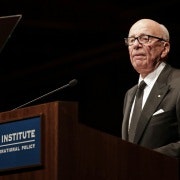Into the wilderness: Labor's tech leadership
Labor leader Bill Shorten has produced a mixed bag of the old and the new in his shadow cabinet; some good, some less than good.
In the many and various portfolios that influence the fortunes of the technology and innovation sectors in this country, it is easy to identify who’s going to be useful.
So here’s a quick guide to who’s who on the Opposition front ranks.
Jason Clare: the rising star
First of all, Jason Clare is not a bad choice for the communications portfolio. He’s a creative and articulate advocate, and despite the questionable handling of the original drugs in sport press conference early in the year as home affairs minister, he is still considered a rising star within the Labor party.
Jason Clare is good in a fight, and has proved that he can take a punch. This is crucial, because in the next 12 to 18 months he is going to get pummelled with every missed deadline, overblown cost and weird line item in the NBN Co budget, as Malcolm Turnbull runs a ruler over the National Broadband Network rollout.
At 41, he is young. Elected on the 2007 Ruddslide, he has never suffered in opposition, which by anyone’s telling, is not nearly as much fun as it looks. But Clare gets it, in terms of new technology will support our economy.
Kim Carr: old world, old economy
A lot will depend on who takes the running on ICT-related industry development and innovation portfolio. If Clare is the upside of the new shadow ministry, the Kim Carr is the downside, retaining his portfolio of higher education, research, innovation and industry.
Senator Carr is old world, old economy. It would be hard to name a minister less interested in the tech sector than Carr.
He was previously ineffective as a minister for this portfolio, and will maintain that grade as a shadow minister. On top of this, he also has a rather strange portfolio that doesn’t quite align with the Abbott ministry.
Carr retains responsibility for one slice of the education sector: higher education. Meanwhile, his counterpart in this field, Christopher Pyne handles the entire education sector – from primary through to tertiary.
Bill Shorten has appointed a new position of “shadow minister assisting the leader on science”. This is a good thing, raising the profile of science within the Opposition against an Abbott ministry that has no delegated minister for science.
But it’s a shame that he also appointed Kim Carr to the role, which only highlighted it as transparent window dressing.
Tony Bourke: the quiet achiever
As shadow Minister for Finance, Bill Shorten has appointed Tony Bourke, the enormously well-regarded quiet achiever of the Rudd-Gillard years. Bourke was an agriculture minister in the years following the 2007, and was then moved to the environment portfolio in the years following the 2010 election.
Memorably, Mr Bourke went from being minister for population to minister for sustainable population during that weird period after Kevin Rudd was dumped (having famously not apologised to anyone for believing in a big Australia through immigration.)
When Tony Bourke was first elected in 2004, no-one could have guessed he would be one of the Party’s best parliamentary and media performers. But he is. And while I can’t imagine he has any particular interest in the tech-related end of the finance portfolio, Tony Bourke will undoubtedly do well regardless.
Michelle Rowland: the newbie with potential
Which brings us to Michelle Rowland, who will assist Jason Clare as the shadow assistant communications minister. And this is a good thing. Michelle Rowland will run that portfolio one day - but she’s still a newbie. She will be excellent.
Shorten has also given Ms Rowland the citizenship and multiculturalism portfolio - which is well suited both to her interests and her electorate of Greenway in Western Sydney.
Wrapping up
Kate Ellis takes the shadow education portfolio, tackling fellow South Australian Christopher Pyne as minister. It is hugely important that the tech sector gets traction in education – but that’s going to be a tough ask given the impending contest between Ellis and Pyne.
Ellis is going to have her work cut out being heard over Pyne, but there are important tech curriculum issues that need to be addressed, and international student issues that the industry needs to press on.
There are a couple of others in the shadow ministry worth noting, and who the tech industry should be starting long-term conversations with. The first is Jim Chalmers, the long-time press secretary turned chief of staff to Wayne Swan.
Dr Chalmers has only just been elected and has been appointed as a parliamentary secretary for trade and Investment (under Penny Wong). He is also a parliamentary secretary to the leader.
Another former Labor staffer who has just entered the Parliament is Tim Watts, who just won Nicola Roxon’s old seat of Gellibrand. Mr Watts is very well known in telco circles, first as an adviser to Stephen Conroy (dating back to Labor’s previous toil in opposition) and then as a senior Telstra regulatory affairs manager. Tim Watts is very smart, and will rise quickly.
Finally to Stephen Conroy, who takes the shadow defence portfolio. I hope he has the energy. It is a good portfolio for him and he will probably be a welcome change (and there is plenty of tech inside defence to keep it interesting regardless.) I am probably not the only one that thinks it is a little bit funny that senior members Don Farrell and David Feeney are the junior shadow ministers in Defence.
James Riley has covered technology and innovation issues in Australia and Asia as a writer and commentator for 25 years.
He has a special interest in public policy as it affects the tech sector and has written for newspapers and trade magazines, including The Australian, the South China Morning Post, InformationWeek and PC Week.
Contact James at james@innovationaus.com
















